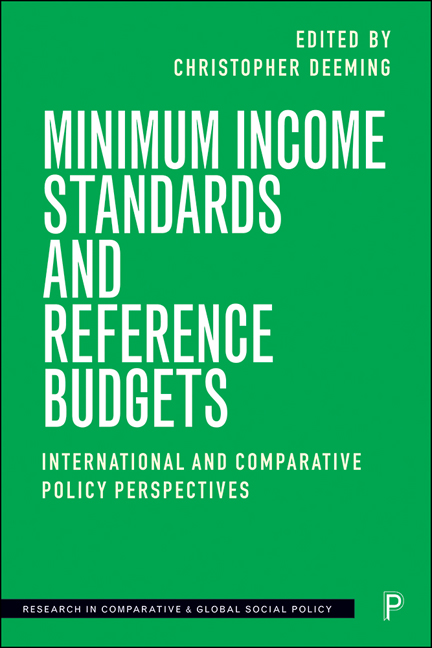8 - Reference Budgets as Tools for Everyday Life, Evaluation and Policy Making in Finland
Published online by Cambridge University Press: 12 March 2021
Summary
Introduction
During the 2000s, reference budgets have been actively drawn up in various parts of Europe (Goedemé et al, 2015; Deeming, 2017). In recent years a consensual approach has been applied in order to determine necessary consumption. The consensual approach implies that the content definition of consumption is attended to by people representing different backgrounds and the result is achieved by means of consensus rather than exclusively by experts from various fields (Bradshaw et al, 2008; Deeming, 2017). Therefore, consumers are now included as a part of the compilation process together with experts. In Finland, the method was used in a modified form for the first time in 2010 (Lehtinen et al, 2010).
On the one hand, various kinds of institutions operate in society, and, on the other hand, people's valuations, preferences and expectations shape conceptions of what constitutes the essential commodities for leading a decent life and the financial resources that should be reserved for their acquisition. Therefore, views of what should be considered indispensable commodities for a decent standard of living require constant updating. The development of conceptual definitions has been more common than the development of definitions which apply to concrete goods and services. This may due to the fact that tangible living conditions and situations vary from country to country and in different regions at different times. For this reason, generic definitions are difficult, if not impossible. The definition of reasonable consumption appears most concretely in reference budgets.
The aims and objectives of the research
The purpose of this article is to describe a consumer-oriented method for defining decent minimum reference budgets and their utilisation in Finland. The purpose of our studies has been to discern the level of consumption that constitutes a decent minimum standard of living on which a person can get by and maintain health while still feeling part of society in today's Finland (cf. Borgeraas, 1987; Lehtinen et al, 2011). In order to establish the decent minimum reference budgets, we have defined which commodities are necessities for that level and why. A starting point for our budget calculations are the needs of a household member combined with household activities. Our task is to specify in concrete terms what goods and services, of what quality, quantity and at what price, one needs to lead a decent life.
- Type
- Chapter
- Information
- Minimum Income Standards and Reference BudgetsInternational and Comparative Policy Perspectives, pp. 109 - 122Publisher: Bristol University PressPrint publication year: 2020



